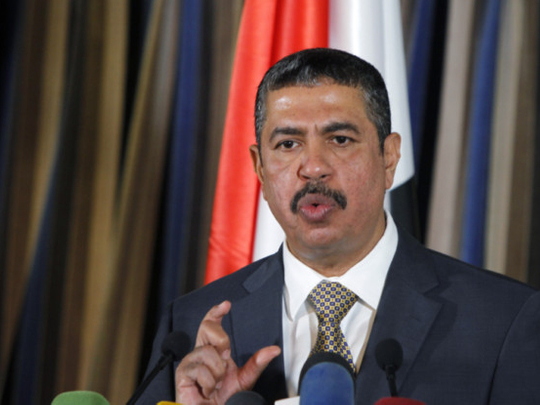
Sana’a: Yemen has sworn in a new government despite objections from the ruling party, led my former President Ali Abdullah Saleh, and allied Al Houthi rebels who control the capital.
Thirty ministers were sworn in on Sunday. Another three rejected their appointments, and three were outside Yemen.
After weeks of wrangling, a UN-brokered deal saw Khaled Bahah nominated as prime minister and tasked with forming a government. All Yemeni parties and political groups eventually agreed on an independent technocrat Cabinet last Saturday.
But Saleh, seen as a behind-the-scenes power broker, and Al Houthi rebels backed away after the UN Security Council approved sanctions against the former leader and two rebel commanders on Friday.
Al Houthi rebels have since dismissed the government as unrepresentative and called for a new lineup. Yemen has been dogged by instability since an Arab Spring-inspired uprising forced Saleh from power in 2012, with the Huthi rebels and Al-Qaeda seeking to fill the power vacuum.
The turmoil has raised fears that the country, which neighbours Saudi Arabia and lies on the key shipping route from the Suez Canal to the Gulf, may become a failed state.
Al Houthis are widely thought to be backed by Saleh, with Washington accusing him of being “behind the attempts to cause chaos throughout Yemen” by using them to weaken the government and “create enough instability to stage a coup”.
A day after the UN measures were adopted, Saleh told members of his General People’s Congress (GPC) they were “rejected”.
The GPC said the UN decision to penalise Saleh for allegedly obstructing the political process is “strange”, insisting that the former strongman “stepped down peacefully” for the sake of a political compromise.
Saleh said he was willing to give up the immunity he was granted after stepping down in February 2012 following nationwide protests, and to face Yemeni justice.
“Find any (corruption) files, refer them to justice and lift the immunity. I will be there to appear in court,” he told the GPC.
The GPC also said it had not been consulted about the long-awaited cabinet, and urged party nominees to turn down their assigned ministries.
Al Houthi rebels similarly rejected the new government, instead demanding a reshuffle to dismiss ministers they consider unqualified or corrupt.
Though the rebels, also known as Ansarullah, are not directly represented, six of the new ministers are considered close to the insurgents.
Despite this, the rebels said Saturday the new government “is in violation of the peace agreement... and a clear obstruction to the political process in favour of private and narrow interests”.
The Security Council, in a statement, urged political forces in Yemen to unite, encouraging “all parties to participate peacefully and constructively in taking forward this transition”.
“The members of the Security Council underscored the importance of moving forward with an inclusive transition process that represents all of Yemen’s diverse communities.”
On November 1, the main parties signed an agreement brokered by UN envoy to Yemen Jamal Bin Omar for the formation of a government of technocrats.
Rebel representatives and their rivals, the Al Islah (Reform) Islamic party, mandated Hadi to form a government and committed to support it.
Washington had welcomed the new cabinet.
“This multi-party cabinet must represent the strength of Yemeni unity over individual and partisan interests that may seek to derail the goals of a nation,” US National Security Council spokeswoman Bernadette Meehan said.
Bin Omar has warned in an interview with AFP that without the rapid formation of a government, tensions between Shiites and Sunnis were likely to increase, sinking the country deeper into crisis.












